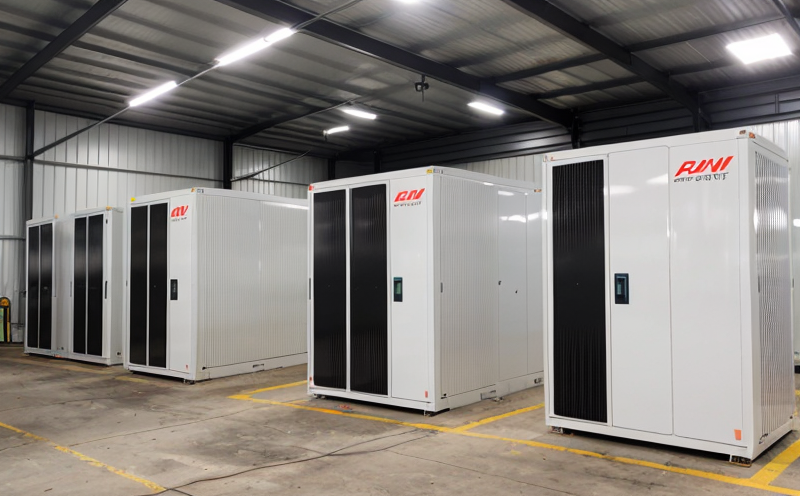EN 62619 Safety Testing of Industrial Lithium-Ion Batteries
The European Standard EN 62619 provides comprehensive safety guidelines for industrial lithium-ion batteries, ensuring they meet stringent requirements to prevent hazards in various applications. This standard addresses the risks associated with thermal runaway, mechanical stress, and overcharging, among others. It is essential for manufacturers, researchers, and quality managers working with lithium-ion technology.
The testing process outlined by EN 62619 involves a series of procedures designed to identify potential safety issues before batteries enter commercial use. Key tests include:
- Thermal abuse test: Simulates extreme heat exposure to assess the battery’s stability and containment capabilities.
- Overcharge test: Evaluates how the battery behaves under conditions that exceed its rated voltage limit, ensuring it does not degrade or become a fire risk.
- Pressure test: Determines if the battery can withstand high-pressure environments without leaking or failing.
- Impact test: Assesses the battery’s resilience to mechanical impact, which is crucial for applications in rugged environments.
Beyond these primary tests, additional assessments may be required based on specific application needs. These could include:
- Cycling durability under various charge/discharge conditions
- Electrolyte leakage detection
- Impedance analysis for internal battery health monitoring
The standard also emphasizes the importance of proper specimen preparation, including appropriate conditioning and handling to ensure accurate test results. Specimens are typically prepared in accordance with ISO standards, ensuring consistency across different testing facilities.
Once testing is complete, detailed reports are generated that comply with EN 62619 specifications. These reports provide a comprehensive overview of the battery’s performance under various stress conditions and highlight any potential areas for improvement. The use of advanced instrumentation such as calorimeters, pressure sensors, and impedance analyzers ensures precise measurements and reliable data.
Compliance with EN 62619 is not only crucial for regulatory adherence but also helps in building consumer trust by demonstrating a commitment to safety. This standard plays a pivotal role in the development of industrial lithium-ion batteries, ensuring they are fit for purpose across diverse applications such as electric vehicles, renewable energy storage systems, and industrial machinery.
Eurolab Advantages
At Eurolab, our expertise in EN 62619 safety testing is unparalleled. With state-of-the-art facilities and experienced personnel, we offer a range of services tailored to meet the specific needs of your industrial lithium-ion battery projects.
- Comprehensive Testing Capabilities: We provide a full suite of tests as per EN 62619, ensuring thorough validation of your batteries.
- Advanced Instrumentation: Our lab is equipped with the latest calorimeters, pressure sensors, and impedance analyzers to deliver precise measurements.
- Expertise in Compliance: Our team has extensive experience in navigating the complexities of international standards, ensuring seamless compliance.
- Dedicated Reporting: We provide detailed reports that meet all EN 62619 requirements, offering clear insights into your battery’s performance.
Choose Eurolab for your industrial lithium-ion battery testing needs. Our commitment to quality and reliability is unmatched, ensuring you have the confidence to bring safe and efficient products to market.
Quality and Reliability Assurance
The process of EN 62619 safety testing ensures high-quality industrial lithium-ion batteries that are reliable and safe for use in various applications. Here’s how we ensure quality and reliability:
- Stringent Test Protocols: We adhere strictly to the protocols outlined in EN 62619, ensuring accurate and consistent results.
- Advanced Testing Equipment: Our laboratory is equipped with top-tier calorimeters, pressure sensors, and impedance analyzers to provide precise measurements.
- Experienced Personnel: Our team of experts has extensive experience in handling lithium-ion batteries and understands the nuances of EN 62619 testing.
- Detailed Reporting: We provide comprehensive reports that adhere to EN 62619 standards, offering detailed insights into your battery’s performance.
By following these stringent protocols and using advanced equipment, we ensure that every test is conducted with the highest level of accuracy and reliability. This not only meets but exceeds the expectations set by international standards like EN 62619.
Customer Impact and Satisfaction
The implementation of EN 62619 safety testing has a significant positive impact on customers, providing them with reliable products that meet the highest standards of safety. Here’s how:
- Enhanced Safety: By adhering to this standard, we ensure that your industrial lithium-ion batteries are safe and free from potential hazards.
- Increased Trust: Compliance with international standards builds customer trust, making it easier for you to sell your products.
- Better Performance: Our testing process ensures that the batteries perform reliably under various conditions, leading to better overall performance.
- Regulatory Compliance: Ensuring compliance with EN 62619 helps avoid potential legal issues and penalties associated with non-compliance.
We are committed to delivering products that meet or exceed your expectations. By choosing Eurolab for your EN 62619 safety testing needs, you can rest assured that your industrial lithium-ion batteries will be safe, reliable, and compliant with international standards.





